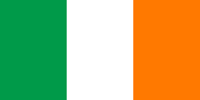"Here's to me, and here's to you. And here's to love and laughter – I'll be true as long as you, and not one moment after."
When you go to college in a fairly rural place where there isn't much else to do but drink, you're going to drink... a lot. When you live in a nation as quiet, simple, and beer-friendly as Ireland, you're going to drink... a lot. Ireland has a storied history with producing beer for themselves and the rest of the continent. Ales were Ireland's first brews, yet these were much different from their unfavorable neighbors to the East in that because Ireland didn't grown their own hops, ales were much maltier. This also meant that beer typically spoiled sooner. Quickly, this was recognized as a problem, so the Irish imported loads of Hops from the Brits in the mid 1700s. All the while, many english Porters were being imported as well. In a response to this, the Irish Parliament used tax incentives to reward brewers who a: used Irish hops and b: produced the most porter. And much of what would happen after revolves around one humble man named Arthur Guinness.In 1759, Guinness moved his fledgling brewery to Dublin, where it would remain to present day. His dry stout was so successful that by 1814, Guinness helped Ireland export more beer to England than it imported. He had taken the idea to brew a porter from London using his own Irish twist on the original brewing practices and ingredients and by the early 1900s, Guinness became the largest brewer in the world. Irish Dry Stout would become famous in all corners of the globe, and in the brewery's more than 250 year history, the original recipe would have changed zero times. Guinness, though not the largest in the world anymore, is still the largest brewer of Stout.
And yet despite all of this, Ireland still sells nearly twice as much Lager as it does Stout. In present day, lager is prefered over stout more times than not among the locals, yet stouts are still a major component of the domestic market. Red Ales are rising in popularity, and craft beers are starting to gain momentum as well. Back in the 1800s, there were more than 200 breweries on the small North Atlantic Island. Today, there are only a dozen or so, yet Ireland still has a strong beer drinking culture that places it fourth after only the Czechs, the Germans, and the Austrians in terms of beer consumption per capita.
Slainte.
Rated Irish Beers
5-29-18 - Franciscan Well Micro Brewery Chieftain - 2.97, Irish Pale Ale, 5.50%
4-30-16 - St. James Gate Guinness Nitro IPA - 2.79, Irish IPA, 5.80%
3-15-13 - Carlow Brewing Company Ohara's Irish Red - 3.86, Irish Dry Stout, 4.30%
4-21-12 - St. James Gate Kilkenny Irish Cream Ale - 2.87, Irish Red Ale, 4.30%
12-07-10 - Carlow Brewing Company Ohara's Irish Stout - 4.25, Irish Dry Stout, 4.30%
5-19-10 - Dundalk Brewery Harp Lager - 3.40, Pale Lager, 4.00%
3-22-10 - Beamish and Crawford Beamish Stout - 3.62, Irish Dry Stout, 4.10%
3-22-10 - Cantrell and Cochrane Group Magners - 2.30, Dry Cider, 5.30%
3-22-10 - St. James Gate Smithwicks Irish Red - 3.34, Irish Red Ale, 4.50%
3-22-10 - Murphy Brewery Ireland Limited Irish Stout - 3.87, Irish Dry Stout, 4.00%
3-11-10 - St. James Gate Guinness Red - 3.96, Irish Dry Stout, 4.10%
Date Expurgated - St. James Gate Guinness Foreign Extra - 3.24, Irish Export Stout, 7.50%
Date Expurgated - St. James Gate Guinness Extra Stout - 3.56, Irish Dry Stout, 6.00%
Date Expurgated - St. James Gate Guinness Draught - 4.02*** - Under Possible Deliberation, Irish Dry Stout, 4.20%
 The Beer List -
The Beer List -




